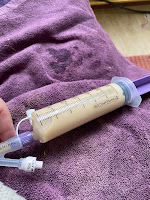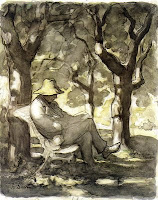This post does relate to writing but I'm going off on a tangent first. Please bear with me.
 |
| My feed |
It is easy for me to become self-reflective at this time of year. Those who know me well know this story but there is a reason behind retelling it. You see twenty-one years ago this month I had surgery to help stop reflux that my body didn't respond well to. I woke up from the anaesthetic unable to eat properly. Twenty years ago this month I had PEG tube fitted. I am not going to give the long name for it, but basically, it is a tube directly into my stomach through which I can pump nutrition. It saved my life but it also meant I was deemed disabled.
When I say I am a disabled author people see the crutches I use and assume it is connected with my joints. They are just a secondary issue. The tube in my stomach is, in fact, my disability.
Why am I telling you this? There is a good reason I promise you. Recently I have been reading a book by Jake Humphrey's and Damian Hughes entitled High Performance. I always like to occasionally read books like this because you never know what you can share with your students. Something I read in there reminded me of the time following the surgery and the years afterwards. In the book, it talks about how you react to setbacks can make all the difference and this is your responsibility.
After the surgery, I was very ill until the PEG was fitted. At the time, I was a single parent with three children aged 15, 13 and 11 who ran her. own business. Things could not be more difficult. I lost my business because I was too ill to work. I'd lost my identity or so it felt. I could easily have given up. The doctors even expected me to do that. But, I refused to. This was no one's fault and how I reacted was my responsibility. This was not the first time I'd had to start my life again. I'd been divorced when the children were very small and I knew I could do it again.
People couldn't understand why I wasn't angry. But angry at who? Anger is so destructive. I couldn't change things. I had to focus on a new life and make sure my children and my mother who I cared for, were all right. The rest is history. I went to university and found a passion for learning. I ended up with a PhD became a lecturer and most importantly fulfilled my dream of becoming an author. You might think this sounds glib. Perhaps even that I make it sound easy. It was not. I had family around me. They were my tribe who supported me through the tough times and there were plenty of those which I'm not going to dwell on.
Please don't get me wrong as well, this is not meant to be a 'woe is me' post. The day the surgery went wrong was actually a great day. It meant I could follow my dreams. I'd never have had the guts otherwise (excuse the pun).
 |
| Achieving my dream! |
Tangent over. Let me bring it back to writing. Being a writer is so often about rejection in some form or another. From an agent, or a publisher, not winning this award or that award, not getting the film rights, not appearing at the literary festival. The list goes on and to some extent, it never stops throughout your writing career potentially. Our friend, social media can ensure that we are constantly reminded of others' successes. My point here is how you react to those setbacks and that is your responsibility as mentioned in the book. It is well worth reading it as they expand upon this. Whatever your reactions to those setbacks are ensure you have your tribe, your people, ready. They are the ones you can talk to in the tough times.
When trying to get an agent, wear any rejections as a badge of honour. Pay attention to what is being said in the email/letter though. Is it useful? Do you feel they might have a point? If several agents are saying the same thing in their rejection letters then you need to pay attention. Also, remember that it is one person's opinion. In the same way, an agent can reject it, it can take only one agent to like it and start your journey to publication.
If you follow me you know I will pull this quote out frequently. It is the one from Matt Haig's Notes on a Nervous Planet where he lists a single sentence 'do not compare yourself'. This is vital when thinking how you are going to react. This is your personal journey. Others may on the surface be succeeding in everything you want, but remember that is the edited social media version. What you don't know is what they are facing behind the scenes. They will be dealing with their own rejections and setbacks.
As far as I am concerned the most important things are to focus on you, your journey and how you react to situations while making sure you are supportive and kind to others.



























